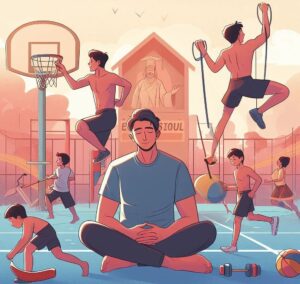In a well-rounded educational program, every component plays a unique role in a child’s development. While traditional subjects such as math and language arts aim to boost intellectual growth, other aspects like physical education contribute significantly to a child’s holistic development. Holistic development refers to the complete nurturing of a child—physically, socially, emotionally, and cognitively. Physical education serves as an integral part of this process.
The Role of Physical Education

Physical education signifies the realm of school curriculum focused on the promotion of bodily exercise, sports participation, and the adoption of wholesome habits integral to overall well-being. It is an educational course designed with precise targets centered around enhancing the physical fitness levels of children, cultivating their fundamental motor skills, and fostering an inclination towards maintaining an actively dynamic lifestyle.
Much more than providing a break from academic learning or acting as an avenue merely for energy dispersion, physical education serves a multitude of advantageous purposes. Firstly, it functions as an imperative contributor towards improved physical health. By engaging children in a variety of physical activities and educating them about the principles of nutrition and healthy living, physical education plays a significant role in combating childhood obesity and fostering a generation of healthy bodies.
P.E. works towards developing cognitive abilities by providing a natural and enjoyable context for the learning process. Research has repeatedly shown that children who engage in regular physical activity exhibit enhanced concentration capabilities, ultimately leading to better academic performances. These improvements in concentration can be attributed to increased blood flow to the brain, leading to the development of more brain cells and connections, which are critical for cognitive functions such as memory and learning.
Physical education aids in refining social skills among children. A rich environment for social interaction, physical education classes facilitate better communication, teamwork, respect for others, and the understanding of winning and losing graciously, skills that are transferable to various other aspects of life.
Physical education serves as a natural stressbuster. The regular physical activity it promotes aids in reducing anxiety levels and increasing self-esteem. It can act as an outlet for pent-up emotions and foster overall emotional resilience among children.
P.E. significantly contributes to holistic child development, delivering tangible benefits across physical, academic, social, and emotional domains within the early stages of life.
Physical Education and Cognitive Development
The influence of physical education stretches far beyond just shaping the physical growth of a child. It plays a pivotal role in bolstering cognitive development—an aspect that is sometimes overlooked. Engaging in regular physical activity not only enhances the child’s strength and endurance but also stimulates the mind, improving attention span, memory, logical reasoning, and critical thinking abilities.
Scientific evidence abundantly verifies that regular physical activity is linked to enhanced cerebral circulation, stimulating the growth and overall health of brain cells. Physical activities prompt the body to release endorphins and other biochemical substances that aid in the enhancement of cognitive functions, significantly increasing concentration levels. As a result, children who engage in regular physical activities perform better academically as they can focus more effectively on their studies, resulting in improved retention and understanding of newly learned concepts.
Physical education classes often involve tasks that require strategic thinking, problem-solving, and coordination, all of which encourage the growth of cognitive skills. Activities such as team sports require children to remember complex rules, strategize with team members, and anticipate outcomes based on actions. These complex tasks stimulate various areas of the brain, improving overall cognitive function.
A body of research corroborates the positive correlation between regular physical activity and improved academic performance. A study by the Journal of Pediatrics found that exercising regularly can enhance children’s executive functions—brain-based skills for managing and organizing information, regulating behaviors, and sustaining productivity—which are required for academic success. The results, therefore, underscore the importance of integrating physical activities into a child’s daily routine.
The relationship between physical education and cognitive development is undeniably significant. It drives home the point that a child’s education should not just be about textbooks and examinations, but also nurturing the mind through physical vigor. In a world where academic pressures can often lead to significant stress among children, physical education provides a well-rounded approach to education, enhancing mental capabilities while simultaneously ensuring physical well-being.
Physical Education and Emotional Development

Physical education is a potent tool for fostering emotional development in children, an aspect often overlooked amidst the more tangible measures of success like academic achievement. By actively participating in sports and physical activities, children not only enhance their physical capabilities but they also nurture their emotional growth in several ways.
One of the key areas where physical education makes an impact is in boosting a child’s self-esteem. When children participate in physical activities, they often face challenges that need to be overcome, such as learning a new sporting skill or aiming to win a game. These experiences present opportunities for children to develop resilience and achievement. Upon mastering a new skill or winning a game, they experience a sense of accomplishment that instills self-confidence and encourages them to take on more challenges in the future, fostering a positive self-image.
Physical education plays a prominent role in reducing anxiety levels among children. Regular physical activity naturally releases dopamine and serotonin, biochemical neurotransmitters essential to the brain for regulating mood. As a result, children often experience improved mood and reduced feelings of anxiety after physical education classes, contributing positively to their emotional well-being.
Physical education also encourages a generally positive outlook in children. The inclusion of team sports and group exercises in physical education curriculum fosters camaraderie and encourages teamwork and mutual support, which can lead to positive interpersonal relationships. This can help children gain empathy, acceptance, and understanding of others and learn to handle different emotions positively, fostering emotional maturity.
The physical exertion involved in physical education provides a healthy and constructive outlet for children to vent their stress and frustration. This form of catharsis can effectively regulate emotional upheavals that children may struggle with, ensuring they’re better equipped to manage their emotional responses healthily in the future.
The role of physical education in a child’s emotional development is indeed vast and significant. It transcends beyond physical fitness and enters the critical domain of emotional well-being, helping children manage their emotions, boost self-esteem, handle stress, and thrive emotionally.

